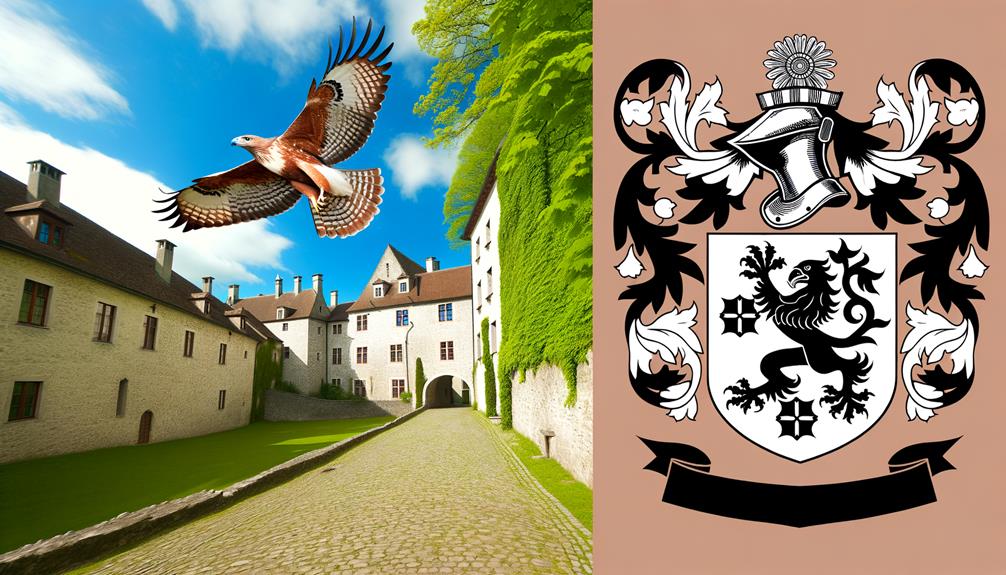Hagen Name Meaning in English
The name 'Hagen' originates from Old High German and Old Norse, signifying 'enclosure' or 'pasture.' Emerging during the early medieval era, it became closely linked with agricultural guardianship and protective roles. The name is widely found in Germany, Norway, and other areas with Norse and Germanic ancestry, mirroring historical migration trends.
Different versions of the name are visible across diverse languages and cultures, highlighting its profound Germanic heritage. Influential individuals bearing the name have impacted various societal domains, ranging from politics to culture.
To obtain a more in-depth understanding of the name's rich historical and cultural significance, additional insights are available.

Key Takeaways
- 'Hagen' originates from Old High German and Old Norse, meaning enclosure, hedge, pasture, or field.
- The name implies agricultural custodianship, land stewardship, and protective roles.
- It reflects a historical association with notable warriors and prominent status.
- Variations exist across Germanic, Scandinavian, Dutch, and English languages.
- 'Hagen' is used both as a first name and surname, signifying strong cultural heritage.
Etymology of 'Hagen'
The etymology of the name 'Hagen' can be traced back to Old High German and Old Norse origins, with its roots embedded in the words 'hagan' meaning enclosure or hedge and 'hagi' meaning pasture or field.
This dual-origin etymology suggests a name intimately connected with agrarian life and the delineation of land. The term 'hagan' implies a sense of protection and boundary, signifying a space set apart, while 'hagi' denotes open land used for grazing.
Consequently, the name 'Hagen' encapsulates both the concept of enclosed land and open, fertile fields, reflecting a historical context where land management and agricultural practices were central to daily life. This linguistic heritage provides a foundation for understanding the socio-cultural implications of the name 'Hagen'.
Historical Origins
Historical records indicate that the name 'Hagen' first emerged during the early medieval period in regions now known as Germany and Scandinavia. This nomenclature is rooted in Old High German and Old Norse languages, where it was often associated with individuals of prominent status or notable warriors.
The name appears in various medieval texts, suggesting its prevalence among the noble and warrior classes. Additionally, the name 'Hagen' is linked to several historical figures, including characters in the Nibelungenlied, an epic poem integral to Germanic literature.
This early medieval context underscores the name's enduring legacy and its role in shaping cultural and social identities within Germanic and Scandinavian societies. Consequently, the name 'Hagen' has a rich historical foundation.
Geographical Distribution
Examining the geographical distribution of the name 'Hagen' reveals its significant prevalence across various regions, particularly in Germany and Scandinavia. This surname is concentrated in areas with historical significance tied to Norse and Germanic heritage. Detailed analysis underscores its frequency in specific locales:
| Country | Prevalence |
|---|---|
| Germany | High |
| Norway | Moderate |
| Denmark | Moderate |
| Sweden | Moderate |
| United States | Emerging |
The data suggests that the name 'Hagen' is deeply rooted in regions historically influenced by Germanic tribes and Norse culture. The presence in the United States indicates migration patterns, possibly linked to 19th and 20th-century European emigration. This distribution reflects both historical roots and modern demographic shifts.
Occupational Significance
Beyond its geographical distribution, the name 'Hagen' also carries significant occupational implications, often associated with agricultural and protective roles in medieval society. Derived from the Old High German word 'hag,' meaning enclosure or hedge, the name suggests a variety of functional responsibilities.
- Agricultural Custodians: Individuals named Hagen were often tasked with maintaining hedges and enclosures, crucial for crop protection.
- Land Stewardship: They frequently held positions as stewards or overseers of estates, managing land resources.
- Protective Functions: The name also implies duties related to safeguarding communities, possibly as guards or wardens.
- Construction of Barriers: Hagens were involved in the building of protective barriers, such as fences and hedgerows, crucial for property demarcation.
These roles underscore the name's historical significance within societal infrastructure.
Topographical Connotations
The name 'Hagen' is intrinsically linked to the landscape, denoting areas characterized by hedges, enclosures, or fenced boundaries. This topographical connotation is derived from the Old High German word 'hagan,' meaning a hedge or enclosed pasture.
Such terminology was particularly significant in medieval Germanic regions, where the landscape often dictated the establishment of settlements and agricultural practices. The presence of a 'Hagen' would indicate a place of protection or demarcation, essential for both agrarian and defensive purposes. These enclosures not only provided security against intruders but also marked territorial boundaries.
Hence, the toponym 'Hagen' encapsulates a historical relation to land management and settlement patterns, reflecting the human interaction with the natural environment.
Linguistic Variations
Building upon the historical and topographical significance of 'Hagen', it is essential to explore the linguistic variations of the name across different Germanic languages and dialects. These variations highlight the name's adaptability and nuanced meanings in diverse contexts.
Particularly:
- In Old High German, 'Hagen' is derived from 'hag', meaning 'enclosure' or 'hedge'.
- In Scandinavian languages, similar forms like 'Hågen' or 'Håkon' are prevalent, emphasizing a common etymological root.
- The Dutch variant 'Haegen' retains the original connotation of an enclosed area.
- In English, 'Hayne' or 'Haynes' emerged as anglicized forms, reflecting phonetic adjustments over time.
These linguistic variations underscore the name's deep roots in Germanic heritage, showcasing its evolution and regional adaptations.
Cultural References
The cultural significance of the name Hagen is reflected in both literary and modern media contexts.
In literature, Hagen is prominently featured in the Germanic epic 'Nibelungenlied,' where he is depicted as a complex and pivotal character.
Contemporary media continues to utilize the name, showcasing its enduring relevance and adaptability across various forms of storytelling.
Literary Influences on Hagen
Numerous literary works throughout history have greatly influenced the interpretation and cultural importance of the name Hagen. In medieval literature, Hagen von Tronje emerges as a pivotal character in the German epic 'Nibelungenlied,' embodying complex themes of loyalty and betrayal.
The name also appears in Norse sagas, enriching its mythological resonance.
Key literary influences include:
- 'Nibelungenlied': Hagen von Tronje as a central figure.
- Norse Sagas: Reinforcement of mythological and heroic dimensions.
- Wagner's 'Ring Cycle': Operatic adaptation amplifying Hagen's dramatic significance.
- Modern adaptations: Reinterpretations in contemporary literature.
These works collectively shape the cultural and symbolic meanings ascribed to the name Hagen, highlighting its enduring legacy in literary traditions.
Hagen in Modern Media
Hagen's presence in modern media manifests through a diverse array of cultural references that underscore its evolving significance in contemporary narratives.
In television and film, characters named Hagen often embody traits of strength and complexity, reflecting the name's historical roots.
Additionally, in literature and graphic novels, Hagen appears as a surname for pivotal characters, reinforcing its thematic resonance.
The name is also prevalent in video games, where it is frequently assigned to protagonists or key figures, thereby enhancing its visibility among younger audiences.
This proliferation across various media platforms not only preserves the name's traditional connotations but also adapts it to modern contexts, illustrating its dynamic role in shaping contemporary cultural and narrative landscapes.
Prominent Families
The Hagen name has a rich historical lineage, with records tracing back to influential families in Europe.
Notable figures bearing the Hagen surname have made significant contributions across various fields including politics, arts, and academia.
These prominent families have not only shaped their immediate communities but have also left a lasting impact on broader societal developments.
Historical Hagen Lineage
Tracing the historical lineage of the Hagen name reveals a tapestry of influential families whose contributions have greatly shaped various regions and eras. Through meticulous genealogical research, several prominent Hagen families emerge, each leaving indelible marks on history.
The historical prominence of these families can be observed through their involvement in various sectors:
- Nobility: Several Hagen families were integral to European nobility, wielding considerable political influence.
- Military Leadership: Distinguished as leaders, many Hagens commanded respect in military campaigns.
- Economic Development: Some Hagen families were pivotal in the economic development of their regions, particularly during the Industrial Revolution.
- Cultural Patronage: Others contributed significantly to arts and culture, sponsoring artists and fostering cultural growth.
This intricate lineage underscores the multifaceted impact of the Hagen name throughout history.
Notable Hagen Figures
Among the myriad of prominent families bearing the Hagen name, several individuals stand out for their noteworthy contributions to political, military, economic, and cultural spheres.
Particularly, General Friedrich von Hagen played a pivotal role in military strategies during the Napoleonic Wars.
In politics, Senator William Hagen's legislative reforms in the early 20th century significantly shaped modern governance.
Economically, industrialist Karl Hagen's innovations in manufacturing processes greatly advanced the field.
Culturally, actress Nina Hagen's pioneering work in punk rock music and avant-garde performance art has left an indelible mark on contemporary culture.
These figures exemplify the diverse and impactful presence of the Hagen name across different domains, underscoring their historical and contemporary relevance.
Hagen Family Contributions
Building upon the individual achievements of notable Hagen figures, the broader contributions of prominent Hagen families have collectively influenced various sectors, reflecting their enduring legacy. These families have left significant marks on society through their diverse ventures and commitments.
- Philanthropy: Many Hagen families have established foundations and charitable organizations, addressing social issues and promoting education.
- Business: Entrepreneurs from the Hagen lineage have pioneered industries, fostering economic growth and innovation.
- Politics: Several Hagens have held influential political positions, shaping policies and governance at local, national, and international levels.
- Arts and Culture: Contributions in literature, music, and visual arts from Hagen family members have enriched cultural landscapes globally.
Analyzing these facets reveals the multifaceted impact of Hagen families on societal development.
Modern-Day Usage
In contemporary times, the name Hagen has seen varied usage across different regions and cultures, reflecting both traditional roots and modern adaptations.
In English-speaking countries, Hagen is often employed as both a first name and a surname. Its usage as a first name signifies a trend towards reviving historical names with strong, evocative connotations. As a surname, Hagen is prevalent in genealogical records, often linked to Northern European ancestry.
Additionally, the name's presence in popular culture, such as in literature and films, has bolstered its modern appeal. In Scandinavia, Hagen remains a common surname, frequently associated with geographic locales or historical figures.
This duality of maintaining heritage while embracing contemporary trends marks Hagen's enduring relevance in modern-day usage.
Conclusion
In an ironic twist, the name 'Hagen,' rooted in ancient etymologies and steeped in historical significance, has transcended its humble occupational and topographical origins to become a global identifier.
Despite its journey through various linguistic transformations and cultural adaptations, 'Hagen' remains steadfast, perhaps even defying the ephemeral nature of names.
Consequently, what began as a simple moniker now paradoxically encapsulates a rich tapestry of human history and identity, proving that names are never just names.






